Portland, Oregon is a city I have for which I’ve always held fond feelings. I grew up fairly close to it, and spent a good deal of time there throughout my youth. It’s also the location of my favorite book store, Powell’s City of Books, a giant new and used book store that where I have spent an amount of money over the years that would add up to a down payment on a house. Whenever I would travel back to visit family, a trip to Powell’s was just assumed to be part of the plan – and I’d always make sure when flying out there that my luggage would have plenty of empty space for all the extra books I’d be bringing back.
However, knowing what I’ve always known about the political zeitgeist in Portland, I wasn’t at all surprised to learn about some new policies that are being rolled out for the public school system there. Among these policies is a mandate that would “prohibit teachers from giving students a failing grade for missing work or even if they are caught cheating.” The news story reports some of the other new policies:
Teachers must also do away with the 0-100 grading scale and replace it with a 0-4 scale, which the district claims is “more mathematically accurate.” Moreover, students’ total grades will reflect only their most recent performance – not their total work over the course of a semester. To combat teachers’ “implicit bias,” homework will not be graded, and teachers cannot provide extra credit or penalize students for “non-academic factors,” including attendance, performance, effort, attitude and behavior.
According to the school district, this new “equitable grading policy” is meant to reduce “racial disparities in our pass/fail rate in multiple subjects in both middle grades and high school.” Let’s just assume that this policy will achieve its stated goals, and the distribution of student grades is more “equitable” in the outcome rather than process sense. Would that mean the policy has achieved something good?
No. Grades are meant to serve a particular purpose – to convey information about a student’s level of mastery on a given topic, as well as how consistently a student carries out assigned tasks. Low grades are a sign that a student is falling short in one or both of these areas, and changing the grade doesn’t change the underlying reality. It’s similar to how prices reflect information about the relative supply and demand for a particular service. Changing the price by fiat doesn’t change the underlying facts that created it – it only masks them, hiding both a useful signal and removing the incentive to respond to that signal.
To a certain kind of reformer, prices simply appear as arbitrary obstacles, interfering with the achievement of some desirable goal. Lacking an appreciation of prices as conveyers of information about an underlying reality, they see changing the price as all that’s needed to “fix” some perceived social problem. When the perceived social problem is the high price of housing, these reformers don’t think about what underlying factors might be creating these high prices (aside from vaguely gesturing at “greed”), and because of that, they don’t see the solution as policy changes that might increase the housing supply. Instead, in their mind, all that’s needed to fix the problem is to implement price ceilings like rent control. There are no further factors to consider, or deeper lessons to be learned.
In the same way, these reformers see low grades as merely an arbitrary obstacle to achieving some other social goal they value. And rather than try to deal with the underlying issues that created the signal, they seek to manipulate the signal instead. But inflating the grades of students who don’t understand the material or who don’t perform the assigned work doesn’t do anything to fix the issues that actually need fixing.
It’s worth pointing out that hiding the accurate signal doesn’t help the students either, for at least two reasons. One was put rather cheekily by the Australian comedian Jim Jefferies in a bit where he was mocking Americans for insisting on affirming everyone’s abilities and always wanting to protect everyone’s self-esteem and self-image. As he put it, “There are two lots of people in life, winners and losers. You’re not going to be a winner at everything and you’re not going to be a loser at everything, but you’ll never figure out what you’re good at in life if they tell you you’re f****ing good at everything!” The other reason is similar to something recently pointed out by David Henderson – when you restrict (or mask) information, people will “look for what statisticians call ‘noisier’ data” instead. When good grades are no longer a reliable signal for a good work ethic and understanding of the material, other signals will be sought. And this is a game that heavily favors the wealthy over the poor. By weakening the signal, these reformers are removing a tool that helps bright students from disadvantaged backgrounds distinguish themselves. In the name of lifting people up, they will only hold more people down.
















